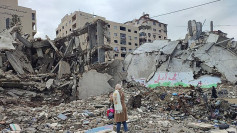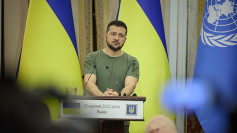According to Ukraine's state energy company, the Chernobyl nuclear power plant and all facilities in the Chernobyl exclusion zone have been entirely unplugged and are currently without power.
Russian soldiers stormed the derelict nuclear facility on the first day of the invasion (Feb. 24), seizing it after heavy fighting and keeping hostage its estimated 210 employees, Live Science previously reported.
The nearly 20,000 spent nuclear fuel units kept in the facility's cooling tanks will no longer get active cooling now that the reactor has been disconnected from the electrical grid.
Ukrainian officials have cautioned that this might increase the likelihood of nuclear material evaporation and discharge, as well as provide a deadly dose of radioactive material to plant staff. Some nuclear energy specialists, however, have cautioned that this event is unlikely because the spent fuel rods are now 22 years old and much cooler than they were.
"The spent fuel rods are at minimum 22 years old. They have very little heat to dissipate," Mark Nelson, the managing director of the Radiant Energy Fund, which advises companies and nonprofits about nuclear energy, wrote on Twitter.
"Their heat is low enough that experts I've talked to expect weeks or even months to heat the water enough to dry out the pool. Even then, natural air circulation should be sufficient."
Although there is yet to be any independent verification of the cause, the Ukrainian State Service of Special Communications and Information Protection has blamed the power outage on "damage caused by the occupiers."
Dmytro Kuleba, Ukraine's foreign minister, stated the Chernobyl nuclear power plant's reserve diesel generators had a 48-hour capacity and appealed for a truce to restore power.
Meanwhile, officials from the International Atomic Energy Agency of the United Nations have expressed growing concern for the safety of Chernobyl workers who have been kept captive for two weeks. Workers used to leave the nuclear factory once their shifts ended, but they are now forced to live on the premises.
On Mar. 8, systems set up to monitor nuclear material at Chernobyl's radioactive waste facilities ceased transmitting data to the UN's nuclear watchdog.
The facility's staff is in charge of decommissioning the site and ensuring the safe disposal of radioactive material from the plant's defunct reactors. That activity, however, has been halted since the Russian occupation of Chernobyl. Workers could only be contacted by email prior to the power outage.
Radiation levels have been reported to be normal at both Chernobyl and Zaporizhzhya.






